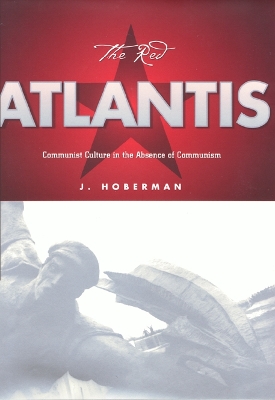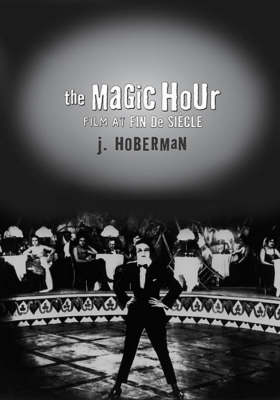Culture And The Moving Image
3 total works
For most of the twentieth century, American and European intellectual life was defined by its fascination with a particular utopian vision. Both the artistic and political vanguards were spellbound by the Communist promise of a new human era -- so much so that its political terrors were rationalized as a form of applied evolution and its collapse hailed as the end of history. The Red Atlantis argues that Communism produced a complex culture with a dialectical relation to both modernism and itself. Offering examples ranging from the Stalinist show trial to Franz Kafka's posthumous career as a dissident writer and the work of filmmakers, painters, and writers, which can be understood only as criticism of existing socialism made from within, The Red Atlantis suggests that Communism was an aesthetic project -- perhaps the aesthetic project of the twentieth century. Considering the meaning of Communist culture in its absence, these essays sift through the wrecking age of Marxist fantasy to exhibit exhumed fossils (Socialist Realist canvases), vanished monuments (the Berlin Wall), imaginary territories (the Jewish state, Birobidzhan), and ideological memories (the Crime of the Century).
The Cold War notwithstanding, the greatest of these exotic artifacts and obsolete scenarios is the lost Communist utopia, which, in fact, never existed.
The Cold War notwithstanding, the greatest of these exotic artifacts and obsolete scenarios is the lost Communist utopia, which, in fact, never existed.
For the past dozen years, J. Hoberman has been publishing witty, impassioned, vivid film criticism in the pages of New York's alternative weekly, The Village Voice. His first collection includes a variety of these (mostly) movie reviews, as well as a number of longer essays and film-festival reports, all written during the 1980s. For Hoberman, film criticism is a form of social commentary, and his articles reflect a decade when an actor was president, the Vietnam War was refought on the nation's movie screens, and soundbites determined elections. The variety of Hoberman's interests and the intellectual depth of his critiques are remarkable. Writing from the perspective of Lower Manhattan, he places movies in the context of the other visual arts painting, photography, comics, video, and TV as well as that of postmodem theorists such as Leslie Fiedler and Jean Baudrillard. Demonstrating the widest range of any American film critic writing today, Hoberman is equally at home discussing the work of Steven Spielberg and Andrei Tarkovsky, films by cutting-edge artists Raul Ruiz and Yvonne Rainer, and historical figures as disparate as Charles Chaplin and Andy Warhol.
"Vulgar Modernism" offers an entertaining, trenchant, informed, and informative view of the past decade's popular culture. J. Hoberman, film critic for "The Village Voice", is the author of a forthcoming history of Yiddish cinema and the co-author (with Jonathan Rosenbaum) of "Midnight Movies".
"Vulgar Modernism" offers an entertaining, trenchant, informed, and informative view of the past decade's popular culture. J. Hoberman, film critic for "The Village Voice", is the author of a forthcoming history of Yiddish cinema and the co-author (with Jonathan Rosenbaum) of "Midnight Movies".
The "magic hour" is the name film-makers give the pre-dusk late afternoon, when anything photographed can be bathed in a melancholy golden light. A similar mood characterized the movies of the 1990s, occasioned by cinema's 1995-96 centennial and the waning of the twentieth century, as well as the decline of cinephilia and the seemingly universal triumph of Hollywood. "The Magic Hour: Film at Fin de Siecle" anthologizes J. Hoberman's movie reviews, cultural criticism, and political essays, published in "The Village Voice", "Artforum", and elsewhere during the period bracketed by the fall of the Berlin Wall and the collapse of the World Trade Towers.Demonstrating Hoberman's range as a critic, this collection reflects on the influence of Fritz Lang, as well as Quentin Tarantino, on the end of the Western and representation of the Gulf War, the Hong Kong neo-wave and the "boomerography" manifest in the cycle of movies inspired by the reign of Bill Clinton.As in his previous anthology, "Vulgar Modernism: Writings on Movies and Other Media" (nominated for a National Book Critics Circle Award), Hoberman's overriding interest is the intersection of popular culture and political power at the point where the history of film merges with what Jean-Luc Godard called "the film of history.
" J. Hoberman is the senior film critic at the "Village Voice" and Adjunct Professor of Cinema at Cooper Union. His books include "Bridge of Light: Yiddish Film Between Two Worlds" (Temple, 1995), "The Red Atlantis: Communist Culture in the Absence of Communism" (Temple, 1998), and the anthology "Vulgar Modernism: Writing on Movies and Other Media" (Temple, 1991) which was nominated for a National Book Critics Circle award in criticism.
" J. Hoberman is the senior film critic at the "Village Voice" and Adjunct Professor of Cinema at Cooper Union. His books include "Bridge of Light: Yiddish Film Between Two Worlds" (Temple, 1995), "The Red Atlantis: Communist Culture in the Absence of Communism" (Temple, 1998), and the anthology "Vulgar Modernism: Writing on Movies and Other Media" (Temple, 1991) which was nominated for a National Book Critics Circle award in criticism.


